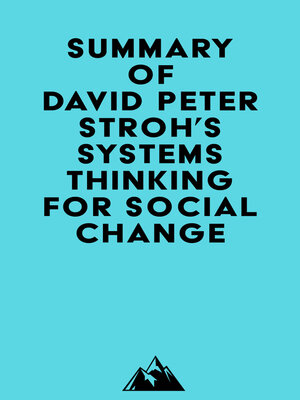
Sign up to save your library
With an OverDrive account, you can save your favorite libraries for at-a-glance information about availability. Find out more about OverDrive accounts.
Find this title in Libby, the library reading app by OverDrive.



Search for a digital library with this title
Title found at these libraries:
| Loading... |
Please note: This is a companion version & not the original book. Sample Book Insights: #1 The world is not that simple; it is a system, and systems thinkers understand that they can't solve parts without considering the whole. The linear thinking mindset is also the basis for most of our current solutions that have failed because they do not address the system's cause but merely its symptoms. For example, we spend billions of dollars trying to reduce teenage pregnancy, but unintended negative consequences are a result because we are treating the symptom but not the cause: abstinence from sex. If you treat only the symptoms, and ignore the causes, you will get only short-term or short-circuiting results. The approach is also the basis for ineffective public policy solutions in general. For example, many approaches to gun violence assume that if we prevent kids from having easy access to guns, then they won't use them to kill people—and therefore, our problem will be solved. Of course, this ignores the fact that if a kid has easy access to a gun, he is more likely to use it to kill someone than if he did not have it at all. Another example is our approach to obesity. #2 Linear thinking, which is the basis for most of our current solutions, does not address the system's cause but simply its symptoms. Systems thinking, in contrast, is based on the understanding that you can't solve parts without considering the whole. #3 Systems thinking is the ability to understand the interconnections in a system in such a way as to achieve a desired purpose. It helps people understand the purpose a system is accomplishing, and prompts them to reflect on the difference between what they say they want and what they are actually producing. #4 Systems thinkers understand that you can't solve parts without considering the whole. Causal feedback loops are the basis for most of our current solutions that have failed because they do not address the system's cause but simply its symptoms.






